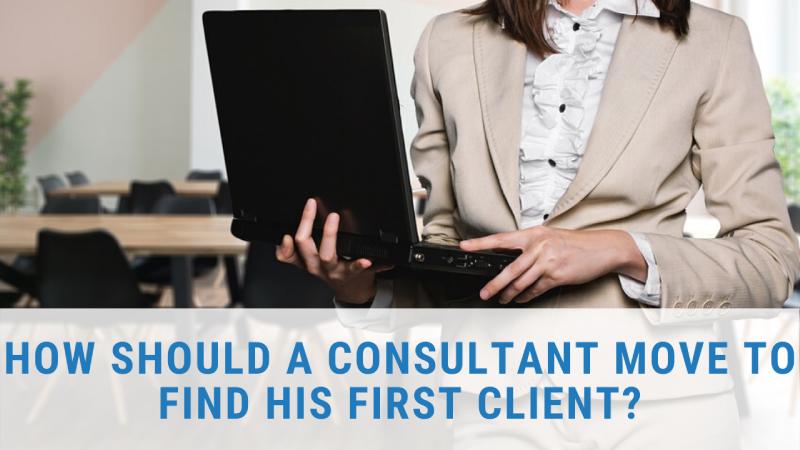The first customer never forgets. But no, I don’t want to tell you the exciting story of how I found my first client. In this article I address all the new consultants, or even earlier to all those people who are planning the big leap into the world of web marketing consultant, who, however, immobilized by the fear of not finding a first customer in a short time, they hesitate to throw themselves, leaving, perhaps, a more comfortable permanent place behind them.
It must be said that fears for the future aside, defining oneself as a consultant is not absolutely difficult: anyone with really expendable skills can actually do it. Ah, and – at least at the beginning – it costs little, very little. In fact, it is enough to invest a few hundred euros in business cards and in a personal website, and boom, you can sell yourself as consultants. The hard part comes soon after when we put ourselves on the trail of the first customers. And you know, the classic paradox begins here: customers require experience, but to gain experience it takes customers.
Everyone takes a different path to become a consultant. The techniques for finding the first client – and the second, and third, and fourth – are in fact similar to any new consultant, and can be summarized in a few steps. Do we want to see them together, to shorten the time that separates you from your first consultation?
What should a consultant do to find the first client?
The first thing a consultant must do to get his first client is to drink a lot of coffee, which after the first few days, to safeguard health, will necessarily have to turn into tea, barley coffee, and juices of the fruit. Yes, because the first step is to talk to all your acquaintances: relatives, friends, ex-colleagues, mentors, old employers. And you know, the simplest and most effective way is to find yourself in front of a coffee – or a beer, but only after 6 pm, for multiple reasons that I am not pointing out.
These encounters with our top-level connections have two different reasons for being. In the first place, talking to those who have known us for a long time and with those who have worked with us can help us better define what our services, our approaches and so on will be. You know what your strengths and weaknesses are, but trust me, those around you will surely have something to highlight that you, perhaps, do not even imagine.
In addition to helping you put together the pieces of your puzzle to start an effective consulting service, your first level contacts will be your first and fundamental megaphones. Maybe you want to become a web marketing consultant, and you find it totally stupid to talk about your future business and your services to your retired aunt or your elementary school mate who works at the post office: they will never need your services!
But perhaps, within their circle, there is someone who is looking for – or who will look for – you. So no, do not present your project only to those who, in your head, are eligible customers. Even your trusted gas station may have a friend or relative looking for someone who can set up a marketing strategy for his business – so yes,
However, talking to acquaintances alone is not enough. The ideal customers exist, they are real people, and it would be wrong to rely on uncontrolled word of mouth only. There are certainly people who might be interested in your services, but you don’t know them directly. But maybe those people are in contact with your ex-work colleague, your wife’s sister or your old swimming instructor.
Do you want to be a consultant? You have to put aside the reluctance and ask your mutual acquaintance to introduce yourself to that person. Or, if you don’t want to go for this person in common, you can contact the ‘second level contact’ directly, reporting the knowledge in common as a referent! LinkedIn, of course,
And then? And then there are ideal customers with whom you have no contact whatsoever: no past relationships, no common knowledge, nothing. You only know that one day you would like to collaborate with them. It will certainly not be easy to turn them into your very first customers, but they may perhaps be your second or third customer!
How can you do to get in touch with them? You could choose a cautious approach, step by step, looking out slowly into their horizon. You can comment on some of their articles or posts, or you can try to participate in their own events. Or again, you can burn the stages by contacting them directly. The important thing, though, is to make sure that you are selling what they really need, and not selling what you want to sell!
And it is here, in fact, that the donkey often falls, especially in the case of new consultants who are looking for their very first customers. In fact, we must remember the fact that, in most cases, companies turn to a consultant when specific problems already exist, to be solved not in a week, not tomorrow, but ‘yesterday’.
And for this they seek consultants with that precise competence, to solve that specific problem. What do the new consultants do instead? They offer themselves as an all-rounder, without focusing on a particular activity. But the less specific your offer, the less potential customers will think of you when they face a peculiar difficulty.
So yes: it will not be easy at all, but already in the beginning, in search of the very first customers, you will have to refine your proposal, concentrating on what you have decided to be your core business Consultant – or the activity that you do best, that will like it more and which, in your opinion, offers the best opportunities.
The first customer reached. And now?
Let’s assume that, thanks to coffee and contact requests, you have finally reached your first potential customer. In short, you have arrived at the decisive coffee.
Before going to the appointment you need to know what you will have to say to the customer – something similar, in short, to the elevator pitches of the Silicon Valley startups. But you will also have to realize that yes, you are probably an expert in your sector, and yes, you probably have all the necessary skills to help what could be your first customer;
despite all this, however, you must remember that you are not yet a consultant, that you have not yet had your true baptism of fire, that you have no real experience in consulting and that soon you will have to meet a potentially skeptical client, who may have already had bad experiences in the past with other consultants and who will want to continue doing his own thing.
And you, in this new and partially hostile scenario, will find yourself having to offer all the necessary value to ensure that first fundamental job, to do it in the best way and to ensure a second, third and fourth customer. Remember this: your goal is not to find a new customer, but rather to satisfy him, with concrete results.



